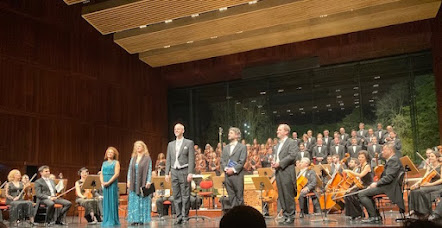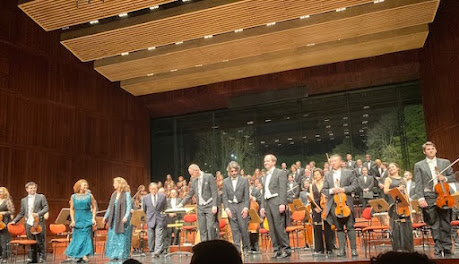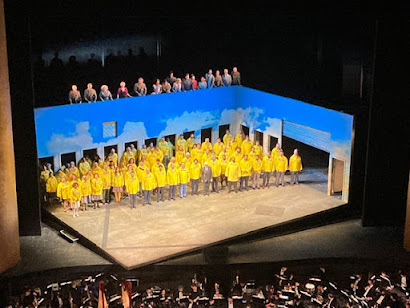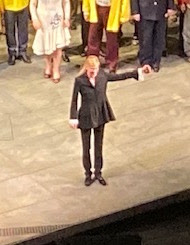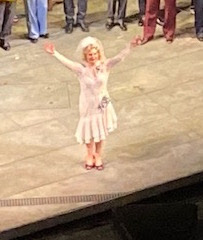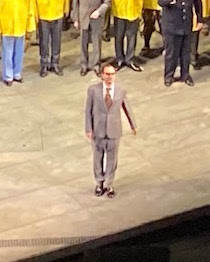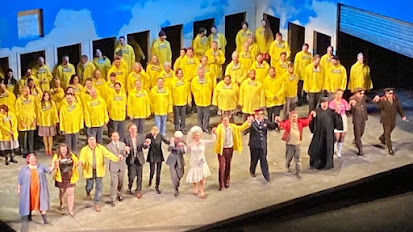(review in English below)
A opera Don Carlo de Verdi, com encenação de David McVicar esteve em palco na Metropolitan Opera, na versão italiana, mais curta (e mais curto é também menos na qualidade e na compreensão do enredo). É uma produção clássica, vistosa, fluida, algo escura mas de entendimento fácil. A componente negativa é a presença de um bobo durante o auto-da-fé.
O maestro foi Carlo Rizzi que dirigiu com interesse a óptima Orquestra da casa. O Coro foi excelente.
De entre os solistas, dois foram absolutamente fantásticos. O Günther Groissböck como Filipe II foi talvez o melhor intérprete que vi e ouvi neste papel. Que presença em palco e que voz! Sempre afinada, audível no mais recôndito canto da enorme sala, de uma beleza ímpar e sempre muito emotivo.
O Rodrigo do Peter Mattei foi também inesquecível. Tem um barítono de uma beleza invulgar, voz sempre perfeitamente colocada e toda a interpretação foi de uma musicalidade inultrapassável. Fantástico! E em palco sempre muito bem, é alto e magro e ágil, o que ajuda muito.
John Relyea com o seu baixo cavernoso e potente foi também um Grande Inquisidor marcante e, no esperado dueto com o Filipe II no 3º acto, foi um dos momentos mais altos da récita.
Ainda referindo os baixos, Toni Marie Palmertree teve interpretações curtas mas excelentes como o fantasma do imperador Carlos V.
O Don Carlo do tenor Rafael Davila (uma substituição), em substituição de Russell Thomas completou o conjunto de intérpretes masculinos de qualidade. Esteve à altura do papel, a voz é agradável, a emissão muito boa e teve um desempenho cénico adequado.
A mezzo Yulia Matochkina foi uma Princesa Eboli muito competente, vocalmente irrepreensível, com graves imponentes, boa extensão vocal e uma presença em palco muito agradável.
A Elisabete de Angela Meade não esteve bem no canto. A voz é muito potente e com uma extensão notável. Contudo, tem um vibrato incomodativo e nos agudos é inconstante e perde qualidade. Outro problema é a presença em palco. A cantora é excessivamente volumosa, mexe-se com dificuldade e praticamente só canta sem representar, o que prejudica a personagem, sobretudo quando rodeada por colegas da categoria dos seus parceiros.
Mas foi um espectáculo excelente e teria sido soberbo com outra Elisabete.
****
DON CARLO, METropolitan Opera, December 2022
The opera Don Carlo by Verdi, staged by David McVicar, was on stage at the Metropolitan Opera, in the Italian version, shorter (and shorter is also less in terms of quality and understanding of the plot). It is a classic production, showy, fluid, somewhat dark but easy to understand. The negative component is the presence of a jester during the auto-da-fe.
The maestro was Carlo Rizzi, who conducted with interest the excellent Orchestra of the house. The Choir was excellent.
Among the soloists, two were absolutely fantastic. Günther Groissböck as Philip II was perhaps the best performer I have seen and heard in this role. What a stage presence and what a voice! Always in tune, audible in the most secluded corner of the huge room, of a unique beauty and always very emotional.
Rodrigo by Peter Mattei was also unforgettable. He has a baritone of unusual beauty, voice always perfectly placed and the whole interpretation was of an unsurpassable musicality. Fantastic! And on stage he's always very good, he's tall, thin and agile, which helps a lot.
John Relyea with his cavernous and powerful bass was also a striking Grand Inquisitor and, the expected duet with Filipe II in the 3rd act, it was one of the highest moments of the performance.
Still referring to the bass, Toni Marie Palmertree had short but excellent interpretations as the ghost of Emperor Charles V.
Rafael Davila's Don Carlo, replacing Russell Thomas, completed the set of quality male performers. He lived up to the role, the voice is pleasant, the emission is very good and he had an adequate stage performance.
Mezzo Yulia Matochkina was a very competent Princess Eboli, vocally impeccable, with imposing low register, good vocal range and a very pleasant stage presence.
Angela Meade's Elizabeth didn't do well in the singing. Her voice is very powerful and has a remarkable range. However, it has an annoying vibrato and in the top notes it is inconsistent and loses quality. Another problem is her stage presence. The singer is excessively bulky, moves with difficulty and practically only sings without acting, which harms the character, especially when surrounded by colleagues of the category of her partners.
But it was an excellent performance, and it had been superb with a different Elisabeth..
****

















